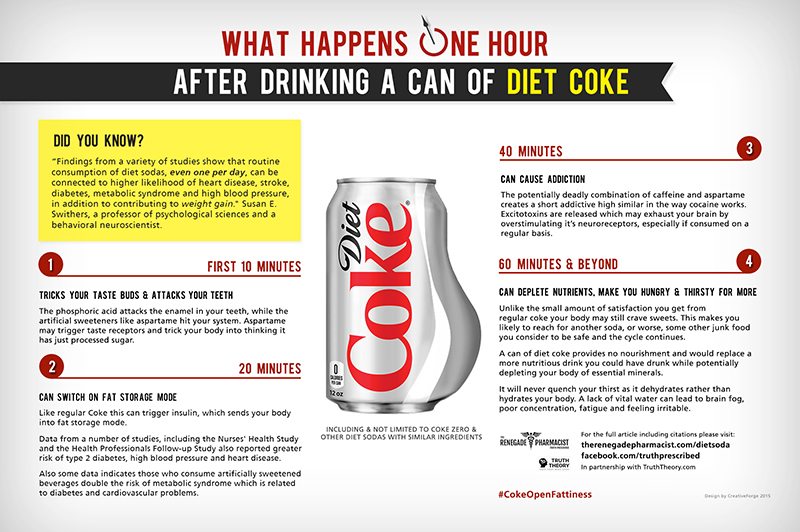Symptoms of Drinking Too Much Diet Coke

We know what its sugary counterpart does, but do you know what happens to your body when you drink Diet Coke?
From the pharmacist that brought us the now famous infograph explaining what Coke, and other cola-based beverages are doing to our overall health, comes an equally disturbing insight into their chemical-filled cousins.
Various studies have proven that routine consumption of diet soft drinks, like diet coke, coke zero and other similar products, can be connected to a greater risk of heart disease, developing Type 2 Diabetes and metabolic syndrome.
So what happens just one hour after drinking a can of diet coke?
First 10 minutes – Your tastebuds are deceived and your teeth are attacked
The high levels of phosphoric acid attacks the enamel on your teeth while the artificial sweeteners – aspartame hits your system and fires up your body's response to sugar. Many other foods and drinks around the world use the sugar substitute, such as chewing gums and breakfast cereals.
Despite being 'one of the most thoroughly tested and studied food additives', food safety experts have been keeping a watchful eye over aspartame since a number of anecdotal reports pointed to potential side-effects.
A study by Italian researchers at the Ramazzini Foundation in Bologna found that rats given dosages of aspartame equivalent to those in humans may develop tumours and several types of cancer.Similarly, an EU-funded project published in 2010 found that pregnant women who drank fizzy drinks containing artificial sweeteners appear to be at greater risk of having a premature baby.
European food regulators remained unconvinced by the research and concluded that the additive could continue to be used.
20 Minutes – May switch on fat storing mode
Don't be deceived by the "no sugar" claims, artificial sweeteners can trigger the exact same insulin responses as sugar does, sending your body into fat-storing mode.
This is due to artificial sweeteners and sugar alcohols interfering negatively with our natural gut bacteria, compromising our immune system and unbalancing the digestive system, according to Amanda Payne of Switzerland's Institute of Food, Nutrition and Health.
40 minutes – You crave more
The combination of caffeine and aspartame creates a short burst of adrenaline, in a similar way to how cocaine works. Excitotoxins are then released which act to overstimulate your brain and neuron receptors.
According to a study published in The Scientist,"Cravings for more coke are explained by the release of two neurotransmitters in the brain, dopamine and glutamate. Caffeine and aspartame increases dopamine levels as shown in various studies.
Aspartic acid taken in its free form (unbound to proteins), significantly raises the blood plasma level of aspartate and glutamate. "Researchers say glutamate is more essential to addiction than dopamine."
60 minutes – The nutrient-less soda makes you hungry and thirsty for more
Your cravings aren't going to stop once you've finished your can or bottle of soft drink. Your appetite for sweets has been turned on and you are more likely to turn to other sugary foods or beverages to quell that need.
Marisa Peer, behavioural psychologist who specialises in eating disorders, said that diet soft drinks are doing more harm than good. "Artificial sweeteners are associated with a drop in the appetite-regulating hormone leptin. Leptin is the hormone that inhibits hunger so diet drinks like diet coke actually make you hungry and less satisfied with normal amounts of food, and finally when you eat or drink a lot of chemicals that your body simply cannot break down, your body makes more and more internal fat to wrap the chemicals in keeping those harmful chemicals away from your vital organs," she says.
"As diet coke has no calories and no recognised ingredients we know it is a cocktail of chemicals that encourage your body to gain and store weight especially on your legs and bottom away from your organs. Diet drinks are not good for your body, your health or even, as it turns out, for dieting."
Of course, everything in moderation… But do we really need to be consuming a beverage that is realistically more a cocktail of chemicals, over something else?

Infographic from The Renegade Pharmacist
Symptoms of Drinking Too Much Diet Coke
Source: https://www.mindfood.com/article/what-happens-to-your-body-when-you-drink-diet-coke/